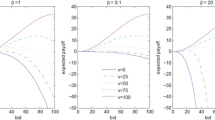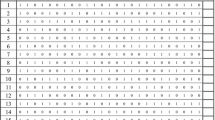Abstract
Preferences for charitable giving in auctions can be modeled by assuming that bidders receive additional utility proportional to the revenue raised by an auctioneer. The theory of bidding in the presence of such preferences results in a very counterintuitive prediction which is that, in many cases, bidders having preferences for charitable giving does not lead to a substantial revenue advantage for an auctioneer. We test this theory and this prediction with a series of experiments. In one experiment we induce charitable preferences exactly as specified in the model to see if bidders respond to them as predicted. We find that they do. We then conduct a second experiment in which the revenue from the auctions is donated to actual charities to verify the robustness of the prediction when charitable preferences are generated by a more natural source and find again that the theoretical prediction holds: even strong charitable preferences do not result in substantial revenue increases to the auctioneer.
Similar content being viewed by others
References
Andreoni, J., & Petrie, R. (2004). Public goods experiments without confidentiality: a glimpse into fund-raising. Journal of Public Economics, 88(7–8), 1605–1623.
Carpenter, J., Holmes, J., & Matthews, P. (2008). Charity auctions: a field experiment. The Economic Journal, 118, 92–113.
Corazzini, L., Faravelli, M., & Stance, L. (2007). A prize to give for: an experiment on public good funding mechanisms (Working Paper). University of Milan-Bicocca.
Corns, A., & Schotter, A. (1999). Can affirmative action be cost effective? An experimental examination of price-preference auctions. American Economic Review, 89(1), 291–305.
Cox, J. C., Roberson, B., & Smith, V. L. (1982). Theory and behavior of single object auctions. In Research in experimental economics (Vol. 2, pp. 1–43). London: JAI Press.
Cox, J. C., Smith, V. L., & Walker, J. M. (1988). Theory and individual behavior of first price auctions. Journal of Risk and Uncertainty, 1, 61–99.
Davis, D. D., Razzolini, L., Reilly, R., & Wilson, B. J. (2006). Raising revenue for charity: auctions versus lotteries. In D.D. Davis & R.M. Isaac (Eds.), Research in experimental economics (Vol. 11, pp. 49–95). New York: JAI Press.
Elfenbein, D. W., & McManus, B. (2007). A greater price for a greater good? The charity premium in online auctions (Working Paper). Washington University in St. Louis School of Business.
Engelbrecht-Wiggans, R. (1994). Auctions with price proportional benefits to bidders. Games and Economic Behavior, 6, 339–346.
Engers, M., & McManus, B. (2007). Charity auctions. International Economic Review, 48(3), 953–994.
Fischbacher, U. (2007). z-Tree: Zurich toolbox for readymade economic experiments. Experimental Economics, 10(2), 171–178.
Gächter, S., & Fehr, E. (1999). Collective action as a social exchange. Journal of Economics Behavior and Organization, 39(4), 341–369.
Glazer, A., & Konrad, K. A. (1996). A signaling explanation for charity. American Economic Review, 86(4), 1019–1028.
Goeree, J., & Offerman, T. (2004). The Amsterdam auction. Econometrica, 72(1), 281–294.
Goeree, J. K., Maasland, E., Onderstal, S., & Turner, J. L. (2005). How (Not) to raise money. Journal of Political Economy, 113(4), 897–918.
Isaac, R. M., & Schnier, K. (2005a). Sealed bid variations on the silent charity auction (Working Paper). Florida State University.
Isaac, R. M., & Schnier, K. (2005b). Silent auctions in the field and in the laboratory. Economic Inquiry, 43(4), 715–733.
Ivanova-Stenzel, R., & Salmon, T. C. (2008). Revenue equivalence revisited. Games and Economic Behavior, 64(1), 171–192.
Morgan, J., Steiglitz, K., & Reis, G. (2003). The spite motive and equilibrium behavior in auctions. Contributions to Economic Analysis & Policy 2(1), Article 5.
Orzen, H. (2008). Fundraising through competition: evidence from the lab (Working Paper). University of Nottingham.
Palfrey, T. R., & Pevnitskaya, S. (2008). Endogenous entry and self-selection in private value auctions: an experimental study. Journal of Economic Behavior and Organization, 66(3–4), 731–747.
Popkowski-Leszczyc, P. T. L., & Rothkopf, M. H. (2009). Charitable motives and bidding in charity auctions (Working Paper). University of Alberta.
Rege, M., & Telle, K. (2004). The impact of social approval and framing on cooperation in public good situations. Journal of Public Economics, 88(7–8), 1625–1644.
Salmon, T. C. (2004). Spectrum auctions by the United States federal communications commission. In M.C.W. Janssen (Ed.), Auctioning public assets: analysis and alternatives (pp. 147–176). Cambridge: Cambridge University Press.
Salmon, T. C., & Isaac, R. M. (2006). Revenue from the saints, the showoffs, and the predators: comparisons of auctions with price-preference values. In D. Davis, & R.M. Isaac (Eds.), Research in experimental economics (pp. 1–30). New York: JAI Press.
Schram, A. J., & Onderstal, S. (2009). Bidding to give: an experimental comparison of auctions for charity. International Economic Review, 50(2), 431–457.
Shachat, J., & Swarthout, J. T. (2002). Procurement auctions for differentiated goods (Working Paper). IBM Research Labs.
Author information
Authors and Affiliations
Corresponding author
Additional information
The authors would like to thank participants of the Rome ESA International meeting, Econometric Society Summer 2008 meeting and Michael H. Rothkopf Memorial Conference for helpful comments. This study was funded in part by a grant from the National Science Foundation, grant #0451970.
Rights and permissions
About this article
Cite this article
Isaac, R.M., Pevnitskaya, S. & Salmon, T.C. Do preferences for charitable giving help auctioneers?. Exp Econ 13, 14–44 (2010). https://doi.org/10.1007/s10683-009-9227-7
Received:
Accepted:
Published:
Issue Date:
DOI: https://doi.org/10.1007/s10683-009-9227-7




